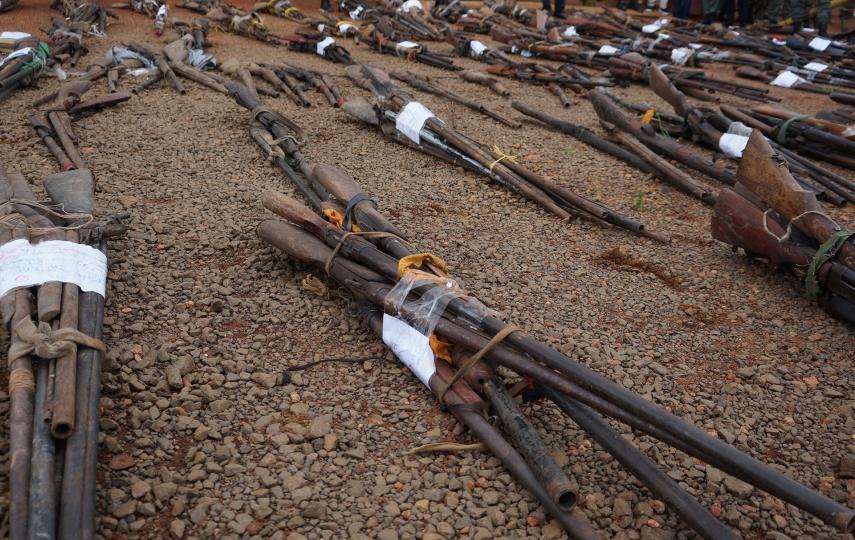I long for a Cameroon where anglophone children no longer mimic the sound of gunfire, and Mondays are no longer “stay-at-home” days decreed by armed men.
I want to go back to a time – not so long ago – when education was a religion in every household, and schools were places children were eager to attend, promising a brighter future.
These days, we have school massacres, boycotts, kidnappings.
We have more than 80 percent of schools closed, and over 1.1 million children out of class.
We have teachers and students stripped naked, terrified, jeered at by gunmen, and those images posted to social media.
We have stay-at-home days – ordered by separatist fighters to demonstrate anglophone solidarity – that merely impoverish us all.
There has been four years of war, but all that suffering seems to be largely ignored by the rest of the world. That’s why, as an investigative human rights journalist, I feel compelled to write this.
Schools become a target
“Ambazonia” secessionists took up arms in 2017 to protest the marginalisation of the anglophone Northwest and Southwest regions by the majority French-speaking Cameroon – an issue keenly felt in those zones at the time.
Much of the killing and violence in this conflict has been by the government security forces – their abuses well documented by rights groups. The counter-insurgency campaign fuels the cycle of violence, and the alleged impersonation of separatist fighters adds confusion to the tragedy.
But lately, trust in the separatist fighters has also begun to fade.
They have enforced an unpopular school boycott since 2016 to protest what they see as the dismantling of the region’s separate education system, and its assimilation within French-speaking Cameroon.
The turning point for public sympathy came in October 2020, when armed men stormed a school in Kumba in the Southwest region and killed seven children and wounded 13 others. Nobody has claimed responsibility for the attack, although the government blamed the separatists.
The Kumba killing became just one in a series. In November, gunmen attacked Kulu Memorial College in the Southwest, and to punish the teachers and students for attending school, stripped them naked and beat them.
Barely 24 hours later, 11 teachers were kidnapped by armed men from a mission school in Kumbo, in the Northwest region. They were released after two days, following pressure from civil society groups and the Presbyterian church.
Intimidated, the local population sits on the fence for fear of being tagged as sympathisers by either side. Others are packing up and leaving the conflict zones.
Evolution of the crisis
Like nearly all the children from these regions, I now know the choking effect of tear gas and the sounds of live bullets.
At the start of the crisis in 2016, I was an eager journalism and mass communication student at the University of Buea – Cameroon's most prestigious English-speaking university – in the capital of the Southwest region.
It was a time of high tension. Student protests against alleged corruption by the vice chancellor turned into much more serious anti-government demonstrations – and the security forces responded with beatings and violence.
The iconic image of those days is shaky cellphone footage from the Buea campus of the security forces deliberately humiliating female students, forcing them to roll in the mud.
There has been four years of war, but all that suffering seems to be largely ignored by the rest of the world.
As students, we were unsure whether it was worth the risk to continue with our studies. But the idea of missing our final exams after three tough years was an even more painful thought.
That was then: Things now are far worse.
Women and girls have been hardest hit by the school closures and lockdowns imposed by the separatists – with a spike in teenage pregnancy, rape, and transactional sex.
In Kumbo, a hotbed of the crisis in the Northwest region, a government health survey of girls aged between 15 and 19 found that the majority were out of school and almost half had become teen mothers.
Yaoundé and major cities like Douala and Bafoussam have seen a huge influx of displaced people. The streets are full of young anglophone children hawking goods. In private homes, young girls are employed as domestic workers, earning as little as $35 a month.
And then came COVID-19 last year. It shut down the world but not the war, and has made the struggles of already poor and vulnerable households so much worse.
Even if parents wanted to send their children to school, the fees are a burden that many can no longer afford.
Change of heart?
I sometimes wonder what would have become of me if I hadn’t mustered the courage to ignore the unrest and complete my studies at the University of Buea.
I have opportunities now – working in Yaoundé – that so many children from the conflict zone will never have; children who these days can barely count to 10, let alone read.
That is leading to some rethinking among separatist leaders in the diaspora – where nearly all are based – over the continuation of the school boycott. After championing the ban for years, activists like Mark Bareta and Eric Tataw, for example, have pressed for armed fighters to allow children to go back to school.
That is good news. But how does the damage of the lost years get repaired?
There was a time when schools in the anglophone region were famous throughout the country as bastions of quality education. This war was supposedly waged to liberate and raise up our children. Poverty and illiteracy seem the only winners.








